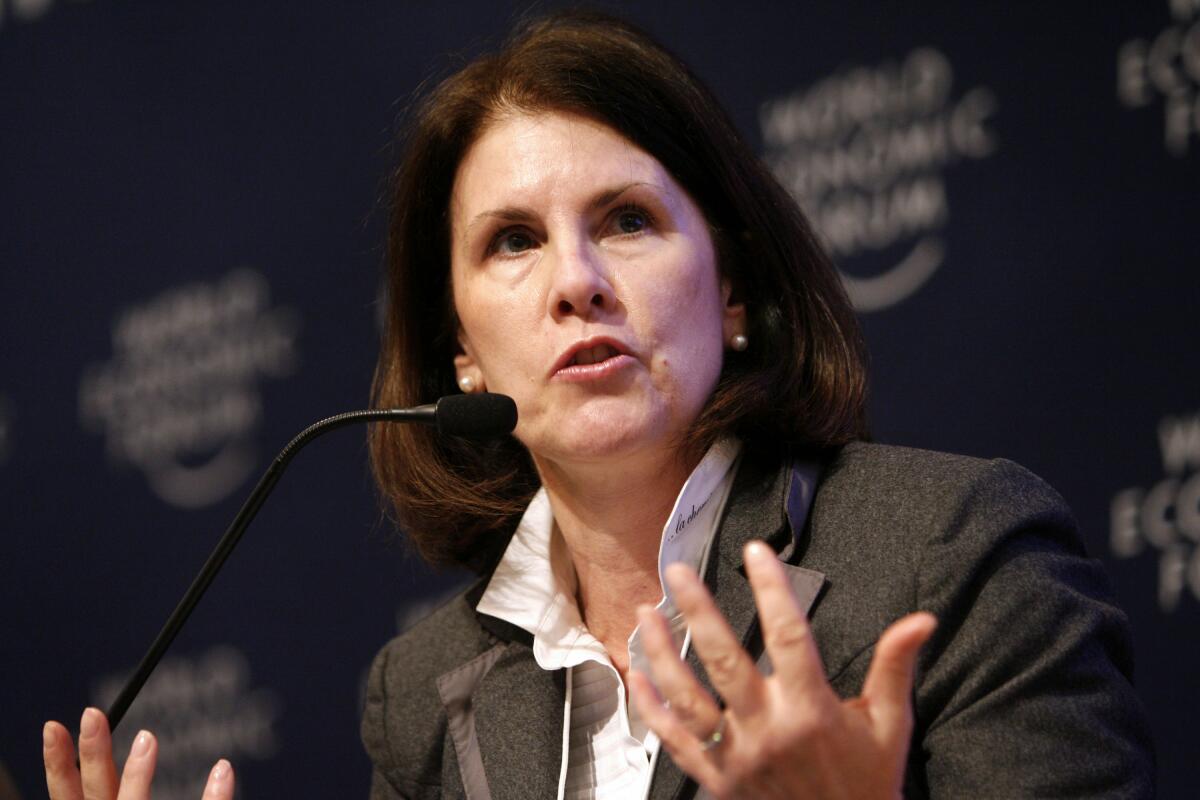USC’s trustees elect first woman as chair of the board as Rick Caruso formally steps down

- Share via
USC’s trustees elected Suzanne Nora Johnson on Thursday to be the next chair of its Board of Trustees, installing a former Goldman Sachs executive with deep experience in running corporate and philanthropic boards to succeed developer Rick Caruso.
Johnson is the first woman to occupy the top oversight post at the private university, and she assumes the role at a time when USC is emerging from years of scandal and internal reforms, recovering from upheaval of the COVID-19 pandemic and, like other universities and businesses, facing rising inflation and a potential recession.
Caruso announced in February that he planned to step down to run for mayor of Los Angeles, and he faces off against Rep. Karen Bass in the November election. He had served as chair since the spring of 2018, when he was tapped to steer USC out of a crisis triggered by revelations of serial sexual abuse by a former campus gynecologist and a wave of dissatisfaction by faculty, staff and students over the ethos and direction of the university.
Under Caruso, the board forced out a once-beloved president; hired a new president, Carol Folt; resolved civil litigation involving the gynecologist’s former patients for $1.1 billion; replaced scores of key administrators; and navigated a raft of scandals related to fraudulent admissions, athletics and sexual misconduct.
“We’ve gotten through the fire. We’ve come out a better university, with better management, and financially in a strong position,” Caruso said in an interview. “I’m delighted to pass the baton to Suzanne.”
Johnson joined USC’s board in 1998, and for much of the time since trustees gave a wide berth to the university’s president and administration on internal affairs.
That changed in 2018, and Johnson was among several trustees who advocated for reforms in how USC’s board members conceived of their role — from that of serving primarily as financial stewards to providing more active oversight and accountability across the education and healthcare enterprises.
Johnson and another trustee spearheaded a study on board governance that led to the rewriting of USC’s bylaws, imposition of term limits on trustees and a gradual halving of the board’s size. Under the new polices, Johnson can remain a voting trustee until 2028. In an interview this week, Johnson said the board would continue to appraise its successes and failures.
“We’ve learned a lot about how vigilant you have to be in a large, complex institution, and what systems, process and people you need in place to prevent that,” she said. “Really good reform is dynamic, and as different issues arise, you test the muscle that you’ve built of good governance.”
Compared with when she first joined the board, the trustees are now more collaborative, engaged and willing to disagree. “It’s not dependent on one or two personalities,” she said.
Folt, who was named president in 2019, said Caruso was a “wonderful partner” in running the university and was key in her transition to Southern California, introducing her to business and political leaders.
“He was always there at any moment with input,” Folt said. “He was also understanding that once you get going, you need to have autonomy.
“I anticipate with Suzanne: more of the same with a very different person,” Folt added, noting that she had worked closely with Johnson, who chaired the searches to hire USC’s new athletic director and chief investment officer.
In the coming years, Folt said, USC plans to focus on affordability, adjusting compensation for faculty and staff so the university can pay a competitive wage, and retaining “values-driven people.” She also said that USC was embarking on a 10-year initiative on computing and artificial intelligence, and that more resources and fundraising would be devoted to the health sciences campus in Boyle Heights, where USC plans to build a new, dedicated research tower.
Johnson graduated from USC in 1979 and earned her law degree from Harvard Law School. She joined Goldman Sachs Group and over two decades rose to become vice chairman and a member of the company’s management committee. She was the highest-ranking woman at the firm when she announced her retirement in 2007 — a move that occasioned the Wall Street Journal to name her a “Goldman Sachs star.”
In addition to leading USC’s board, Johnson is co-chair of the Brookings Institution, board chair of Intuit and a member of the board of directors at Pfizer. Johnson said she had recently concluded her tenure as a director at Visa and trustee at the Carnegie Institution of Washington to permit more time to serve at USC.
Johnson said she planned to work toward Folt’s agenda of access, affordability and sustainability. She also said she wanted USC’s clinical and theoretical research agenda to be “pushed harder.”
Trustees, she said, were also mindful of tending to the long-term welfare of the university, which is L.A.’s largest private employer.
“You need to have a healthy institution to be able to survive and thrive in the years ahead,” she said. “By healthy, I mean culturally healthy, economically sustainable, appropriately responsible from an environmental point of view, and including a wide variety of communities that consider themselves part of the Trojan family.”
More to Read
Sign up for Essential California
The most important California stories and recommendations in your inbox every morning.
You may occasionally receive promotional content from the Los Angeles Times.














